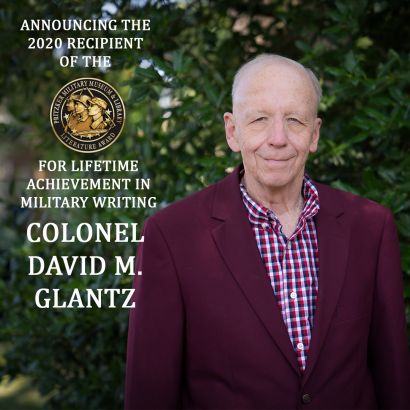
David M. Glantz, Colonel USA (Ret.)
Military Historian, writer, educator and Retired United States Army Colonel, David M. Glantz is the 14th recipient of the Pritzker Military Museum & Library Literature Award for Lifetime Achievement in Military Writing.
Glantz is the author, co-author or editor of more than 60 publications including his Stalingrad trilogy, When Titans Clashed: How The Red Army Stopped Hitler, and The Battle of Kursk. He has gained recognition for his extensive knowledge of World War II battles on the Eastern Front as well as the Soviet Union’s role in World War II.
I accept this award with genuine humility and heartfelt joy. To be awarded for doing what you have loved doing for more than forty years is an honor indeed.
Now in its fourteenth year, the Pritzker Literature Award was first presented to historian James McPherson in 2007. Past recipients – several of whom served as members of the award’s 2020 screening committee – are Dennis Showalter, Peter Paret, Sir Hew Strachan, David Hackett Fischer, Sir Antony Beevor, and Tim O’Brien.
COL. (RETIRED) DAVID M. GLANTZ is a graduate of the Virginia Military Institute, where he received the designation of Distinguished Military Graduate, and earned his master’s degree in modern European history at the University of North Carolina, Chapel Hill. Beginning his military career in 1963, Glantz has more than thirty years of service in the United States Army including numerous field artillery assignments. In addition to his military career and the extensive education that came with it, he is the recipient of the Distinguished Service Medal, the Legion of Merit, two Bronze Star medals, and two Meritorious Service medals, among many others. Glantz founded and was editor of the Journal of Soviet Military Studies in 1988, a position he held until January 2018. He is a member of the Academy of Natural Sciences of the Russian Federation and a 2015 recipient of the Russian Federation Ministry of Defense's medal "For the Strengthening of Military Cooperation.” In 2000, he received the Society for Military History’s Samuel Eliot Morison Prize for his work in the field of Soviet military history.